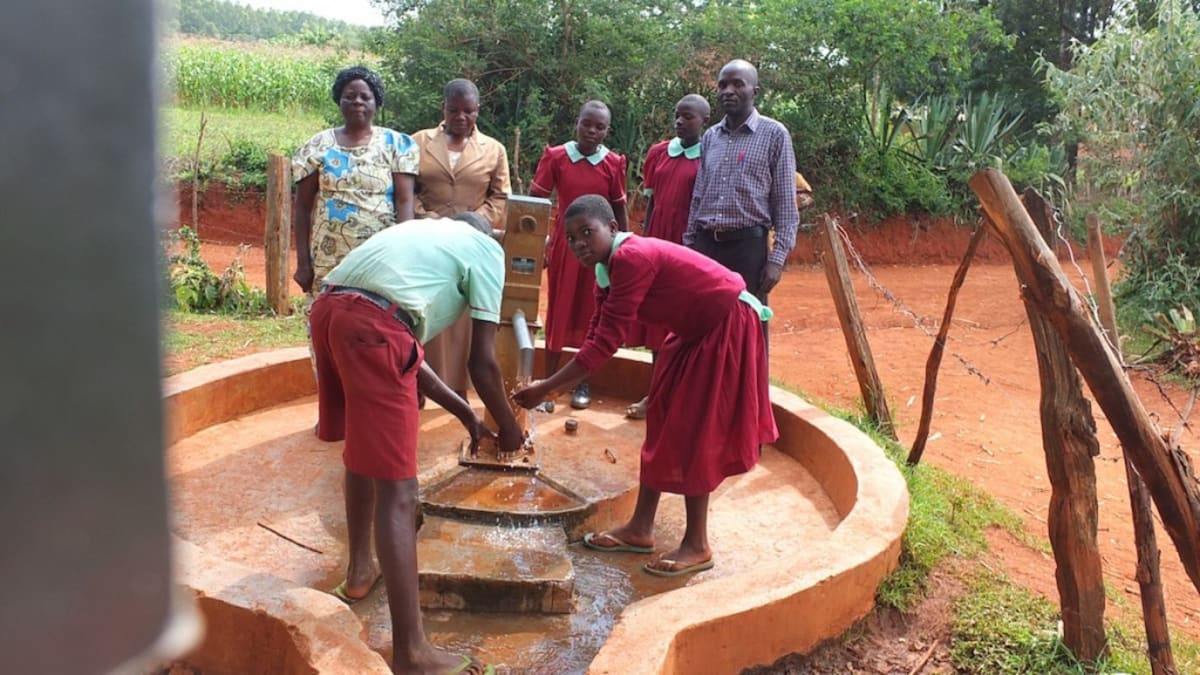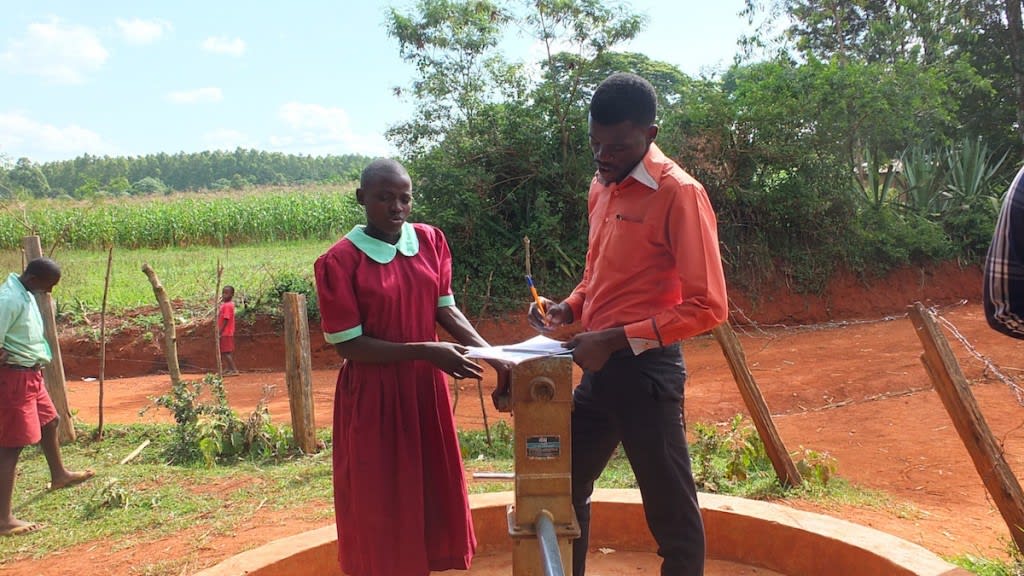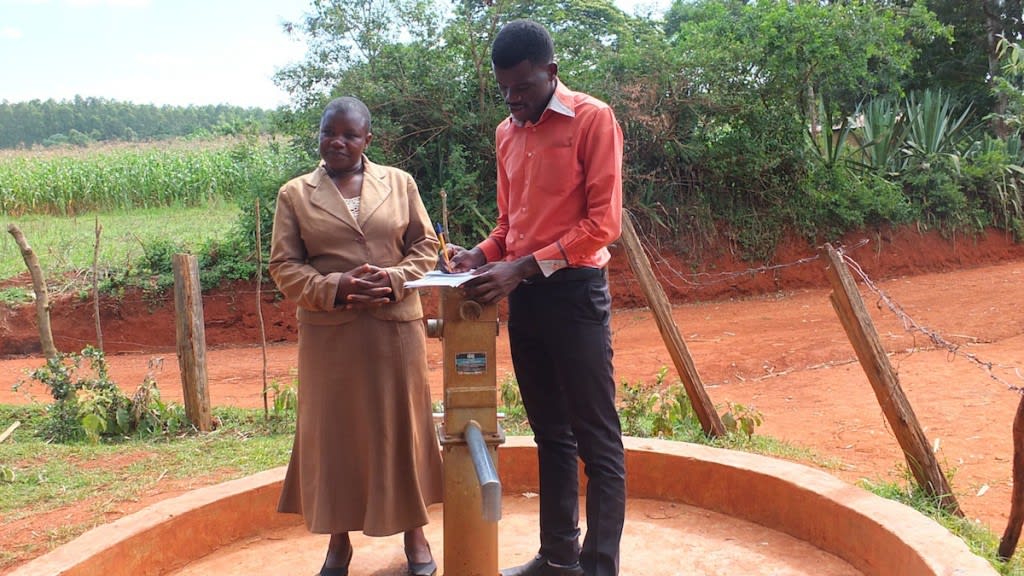This project is a part of our shared program with Safe Water and Sustainable Hygiene Initiative (SAWASHI). Our team is pleased to directly share the below report (edited for clarity, as needed).
Background Information
Located in the neighborhood of Malichi, the school was started with an aim of imparting knowledge to the children of this community. The inhabitants of this community are peasant farmers who depend mainly on crop production. Even with the products harvested from their small farms, this community's level of poverty is still very high. Parents have no choice but to work even harder so as to make ends meet. Most of families in this community must live life of hand to mouth, which means that they do not have enough to save, but only enough to consume right away. As a result of lack of knowledge and ignorance, most people in this community don't acknowledge family planning and thus every couple has at least six children or more.
The Current Source
Every morning of Monday to Friday, the pupils report to Malichi Primary School in hopes of shaping brighter futures. Kenya Finland Company built this well in 1989 but since then, the pump has stopped working. Some parts need to be repaired, but they are not available at the local market.
With no safe water source in the school, pupils' academic performance is also lacking. Instead of studying, students are often fetching water at a neighboring home that has a shallow well. Unfortunately, the well is prone to dry up when the consumer demand is high. Because of this, pupils are not able to access this well during dry seasons because it dries up completely.
The neighbor's shallow well is a little over one kilometer away from the school, and as of now has a temporary rope pump installed. The well pad is also old and dirty, allowing contamination of the water inside. Head Teacher Alice Muyukani says, "Most of our pupils perform poorly in there academics because the time wasted in search of water. Some don't even concentrate during lessons. I believe that with water, life will be manageable in this school and the whole community."
Rehabilitation of the well on the school's campus will result in both a new well pad and new pump. The water source proved to be accessible throughout both the dry and rainy seasons, and so it should be able to serve the school again. And with a water user committee watching over the well, operations and maintenance will be more effective.
Sanitation Situation
There are 10 latrines on campus. The pit holes are not covered, but latrines are cleaned at least once a week. There is one hand-washing station, and there is a dish rack available. The school uses a large, open area to dump their garbage. During the initial visit to the school, we noticed that students and staff do in fact know a little about good sanitation and hygiene, but are not motivated to put their knowledge to use.
Two more hand-washing stations will be installed in the form of “tippy taps.” Tippy taps are containers tied to a rope; when the rope is pulled, it tips the container to pour water.
Training Sessions
Teachers and students will be trained in hygiene and sanitation over the course of three days. The facilitator will use the CHAST (Children’s Health and Sanitation Training) method to help students differentiate between good and bad practices, and will teach a session about disease transmission and prevention. Not only will students and staff be educated on these important topics, but will together form a water user committee that will be responsible for the rehabilitated borehole and other sanitation facilities such as latrines and tippy taps.
During the initial survey of this site, the local assistant chief was fully engaged in ensuring that the whole community is sensitized and has full information in regards to the rehabilitation of this well. The assistant chief has also promised to ensure that SAWASHI has the necessary environment to complete this anticipated project.
Project Results: Training
Training was held at the school for three consecutive days. The first day was set aside of lower primary, the second for upper primary, and the third was for distribution of hand-washing stations and demonstrations. A section of pupils from each grade was selected to attend, and parents and local leadership were also present. Teachers in attendance were especially helpful during training for the lower primary students.
The CHAST (Children’s Health and Sanitation Training) methods were used to teach different grades different topics:
For lower primary, they:
- Analyzed the problem: Learned how flies spread germs and how disease is spread in general
- Identified the problem: Memorized good and bad hygiene practices
- Practiced good behavior: Hand-washing exercises, toothbrushing, toilet use, and face-washing
For upper primary, they talked about:
- Clean is beautiful: Why do we wash hands? When? How?
- I drink safe water: Different types of water sources, differentiating between safe and unsafe water, water treatment
- Going to the latrine: How? Health risks of open defication, latrine maintenance
- My school is beautiful: Keeping a clean environment, anti-litter campaigns, roles of the school health club
- Germ-free food: Covering food and proper preparation
- How to prevent diarrhea: Fecal-oral disease transmission routes, symptoms of diarrhea, blocking transmission
The facilitator made sure students actively participated with each other in small and large groups. Presentations were also made with the help of a projector, and participants also enjoyed on-site training as they and their teachers walked the school campus, talking about what they saw.
Three days of hygiene and sanitation training are a great kickstart to improving students' school and home environments. And now that there is sufficient safe water within reach, the school and greater community will have more time and resources to address other issues: Most students go to school barefoot because they are from very poor families, and are at great risk of contracting more diseases from using dirty latrines with no shoes! [Editor's Note: We hope to see this change in the near future. Ongoing conversations with our partner in Kenya will reveal how the improvements we have made, both in water and sanitation, unlock even greater things!]
Hand-Washing Stations
These were delivered on the third day of training, and can be seen in the latest picture update. Students were trained on how to use and maintain these properly on that same day.
Well Rehabilitation
Construction for this well began on March 10th. The construction team took an entire day to remove the old well pad. If you like demolition work, this is exactly what they were doing! The cement was old and cracked, and thus had to be fully removed before the pad could be built again. The following two days, the team reconstructed the well pad with new materials: a composite of concrete, sand, and cement. The well pad was left to cure for three days before the Afridev pump was installed.
The school kept involved in this process, making sure the work team always had food! With everybody’s effort, there were no challenges and delays to construction.
At the completion of this well, Head Teacher Alice Muyukani said, "My school is glad that the rehabilitated water system will be of great importance to the pupils. Time will be saved and this will have an impact on our academic performance."

 Protected Dug Well
Protected Dug Well






















